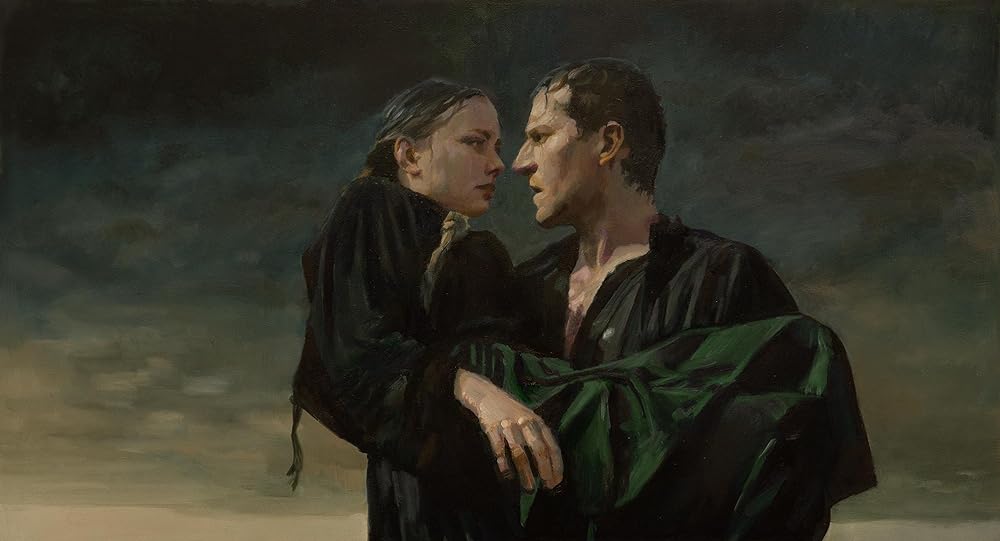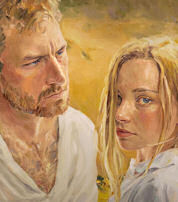Epic. That is the term the Nobel committee used in awarding Wladyslaw Stanislaw Reymont the Nobel Prize for Literature in 1924 for his novel, “The Peasants.”
In 2023, the film version of “The Peasants” was released at various film festivals. It will be released in theaters in the US in 2024 – 100 years after its origin material was recognized by the Swedish Academy.
The film cannot expect to do justice to the novel – few films, even the greatest, do. But it is epic in its own way, due to how it was produced.
“The Peasants” tells the story of a single year in the life of a small peasant village in Poland. The people there are all poor, scraping a spare living from their small, poor fields and their right to wood from the nearby forest. Most of Polish land at that time was owned by absent landlords or landed gentry.
However, even in this impoverished village, there is a hierarchy. At the top is Maciej Boryka (Miroslaw Baca – “Squared Love”), the head farmer and “richest” man in the village. He rules over his extended adult family, especially his hothead son, Antek (Robert Gulaczyk – “Lek”), with an iron hand. Maciej is a widower, and his friends convince him he should remarry. They consider the available girls in the village, and settle on the young, beautiful and vivacious Jagna (Kamila Urzedowska – “Zolza”). However, Jagna is already smitten with Antek, Maciej’s already married son. Hanka (Sonia Mietielica – “Into the Wind”), Antek’s wife and mother of his children, plays an important role in keeping the family together, despite multiple tragedies and the rigid patriarchal society into which she was born. Add to this the terrible gossip of the jealous women of the village and the boastful lying of several young men, and you have an explosive combination.
What has been set up for us is the classic tale of familial strife and social approbation so common from classic myths to modern soap operas. However, the richness of the detail of daily life through the four seasons makes for a more valuable experience. True to the design of the novel, the film is divided into four sections, each of which features a major event in the life of the village: Autumn, Winter, Spring, and Summer. In that parallel with nature, the story shows how the life of the village is tied to the natural progression of the year.
Of particular note is how this film was made. It was shot with live actors first, then artists were commissioned to do oil paintings of the scenes. Finally the oil painting were “sewn together” to make for an animated feature where each frame is a rich, individual work of art. The effect is phenomenal and far from any animation you have seen before. Aside from the original shoot, over 200,000 hours were spent over five years to create what we see in 114 minutes. Going even further, the directors laid out specific scenes in the film’s design to interpret existing paintings by young Polish artists of the 19th and 20th centuries. So what we view is far more than simply a recollection of what life was like in a peasant village in Poland at the turn of the century, it is also a panorama of Polish art.
This film is a must for any lover of cinematic art, especially the amalgam of literature, the human tragedy, and pictorial representation – all from a Polish perspective.
The film’s soundtrack is in Polish with English subtitles. This puts the non-Polish speaking viewer at a disadvantage since some of the rich vibrancy of the images is lost in having to read the subtitles. In addition, of necessity, some of the subtitles are on the screen very briefly. A second viewing, ignoring the subtitles, will give you a greater appreciation for the epic images being presented. It’s like watching paintings in an art museum come to life.

Credits
Directors: Dorota Kobiela Welchman, Hugh Welchman
Writer: Dorota Kobiela Welchman, Hugh Welchman, Wladyslaw Stanislaw Reymont
Producers: Sean M. Bobbitt, Hugh Welchman
Cinematographers: Szymon Kuriata, Radek Ladezuk, Kamil Polak
Editors : Beata Hincke, Patrycja Pirog, Miki Weeel, Dorota Kobiela Welchman
Music: Lukasz Rostowski
Runtime: One hour, 54 minutes
Availability: Limited theater release Jan. 26, 2024
. . .
Join us on Facebook at
http://www.facebook.com/itsjustmovies!
